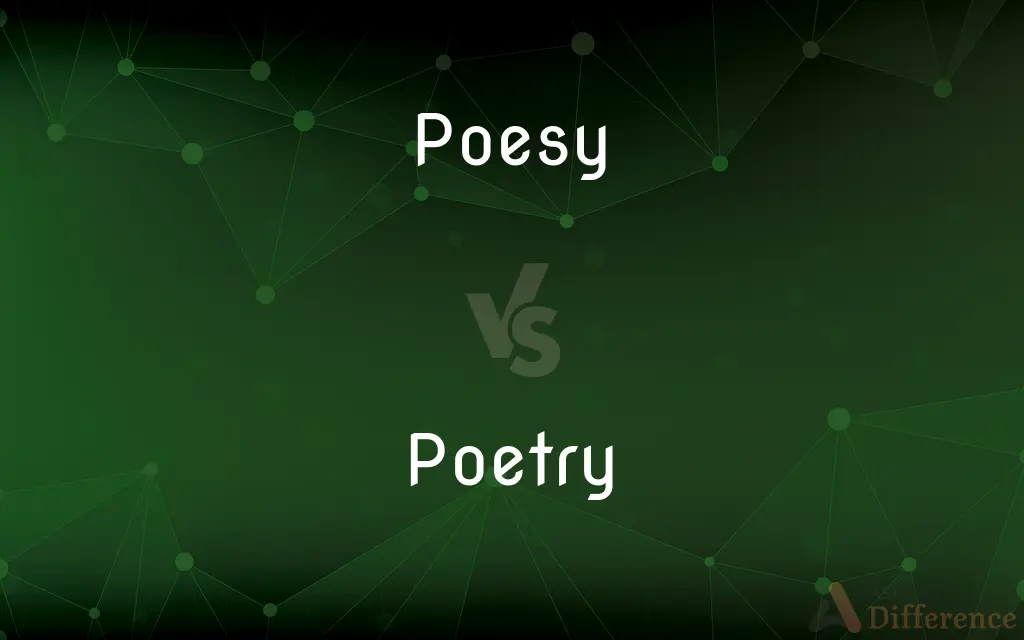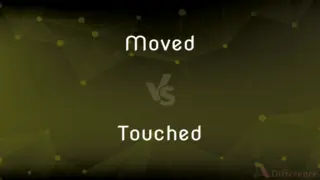Poesy vs. Poetry — What's the Difference?
Edited by Tayyaba Rehman — By Maham Liaqat — Updated on April 3, 2024
Poesy refers to the art or craft of writing poems, emphasizing the aesthetic and expressive qualities of language, while poetry is the product of this art, focusing on structure, meaning, and emotion.

Difference Between Poesy and Poetry
Table of Contents
ADVERTISEMENT
Key Differences
Poesy is often seen as an older, more encompassing term for the art of poetry, highlighting the craftsmanship and creative process behind writing poems. It emphasizes the artistic and aesthetic aspects of language, suggesting a broader scope that includes the creation, theory, and criticism of poetry. On the other hand, poetry is the tangible output of this creative process, the collection of poems themselves. It focuses more on the structure, rhythm, and meaning conveyed through words, as well as the emotional response these words elicit from readers or listeners.
Poesy is about the beauty and elegance of expression, often associated with the ideal or the essence of poetry as an art form. It conjures images of the poet at work, crafting verses that elevate language beyond its ordinary confines. Poetry is about the final product, the crafted verses that resonate with readers, encompassing a wide range of forms, from sonnets and haikus to free verse. It is the manifestation of poesy's concepts, where the abstract becomes concrete, and ideas are encapsulated in linguistic form.
While poesy can be seen as a broader concept that includes the appreciation and critique of poetic works, poetry is more specifically the body of work produced. Poesy might discuss the philosophy and aesthetic principles behind poetry, whereas poetry itself is the practical application of these principles, the actual verses that reach the audience.
Poesy evokes a sense of tradition and the classical roots of poetry, reminding us of the time when poetry was not only an art form but also a vital part of cultural and social expression. Poetry, while certainly grounded in this tradition, has evolved to reflect contemporary themes, styles, and concerns, demonstrating the dynamic nature of the art form.
The distinction between poesy and poetry lies in their focus: poesy on the craft and beauty of creating poetry, and poetry on the crafted work itself. This nuanced difference highlights the depth and richness of the poetic tradition, encompassing both the act of creation and the created work.
ADVERTISEMENT
Comparison Chart
Definition
The art or craft of creating poems
The product of the art of poesy, encompassing various forms
Focus
Artistic process and aesthetic qualities of language
Structure, meaning, and emotional impact of written works
Scope
Broad, including creation, theory, and criticism
Specific, referring to individual works or collections
Association
Tradition, craftsmanship, and the ideal essence of poetry
Contemporary themes, styles, and reader engagement
Primary Emphasis
The beauty and elegance of expression
The tangible verses and their resonance with readers
Compare with Definitions
Poesy
Expression and Beauty.
Through poesy, she explored the beauty of nature and human emotion.
Poetry
Emotional Impact.
The poetry reading left the audience deeply moved.
Poesy
Creative Process.
Her love for poesy was evident in the meticulous way she crafted her verses.
Poetry
Structural Form.
He experiments with various forms of poetry to express his ideas.
Poesy
Art of Poetry.
The seminar on poesy delved into the nuances of poetic expression and theory.
Poetry
Contemporary Themes.
Modern poetry often tackles themes of identity and social justice.
Poesy
Aesthetic Qualities.
Poesy emphasizes the musicality and rhythm inherent in language.
Poetry
Collection of Poems.
Her latest book of poetry has been critically acclaimed.
Poesy
Tradition and Craft.
He studied the masters of poesy to refine his own poetic voice.
Poetry
Reader Engagement.
Interactive poetry workshops help engage readers in the creative process.
Poesy
Poetical works; poetry.
Poetry
Poetry (derived from the Greek poiesis, "making") is a form of literature that uses aesthetic and often rhythmic qualities of language—such as phonaesthetics, sound symbolism, and metre—to evoke meanings in addition to, or in place of, the prosaic ostensible meaning. Poetry has a long and varied history, evolving differentially across the globe.
Poesy
The art or practice of composing poems.
Poetry
The act or practice of composing poems.
Poesy
A poem.
Poetry
Poems regarded as forming a division of literature.
Poesy
(archaic) The class of literature comprising poems.
Poetry
The poetic works of a given author, group, nation, or kind.
Poesy
To write or perform poetry.
Poetry
Literature written in meter; verse.
Poesy
The art of composing poems; poetical skill or faculty; as, the heavenly gift of poesy.
Poetry
Prose that resembles a poem in some respect, as in vivid imagery or rhythmic sound.
Poesy
Poetry; metrical composition; poems.
Music and poesy used to quicken you.
Poetry
The essence or characteristic quality of a poem
"It is impossible to separate the 'poetry' in Paradise Lost from the peculiar doctrines that it enshrines" (T.S. Eliot).
Poesy
A short conceit or motto engraved on a ring or other thing; a posy.
Poetry
A quality that suggests poetry, as in grace, beauty, or harmony
The poetry of the dancer's movements.
Poesy
Literature in metrical form
Poetry
Literature composed in verse or language exhibiting conscious attention to patterns and rhythm.
Poetry
A poet's literary production.
Poetry
(figurative) An artistic quality that appeals to or evokes the emotions, in any medium; something having such a quality.
That 'Swan Lake' choreography is poetry in motion, fitting the musical poetry of Tchaikovski's divine score well beyond the literary inspiration.
Poetry
The art of apprehending and interpreting ideas by the faculty of imagination; the art of idealizing in thought and in expression.
For poetry is the blossom and the fragrance of all human knowledge, human thoughts, human passions, emotions, language.
Poetry
Imaginative language or composition, whether expressed rhythmically or in prose. Specifically: Metrical composition; verse; rhyme; poems collectively; as, heroic poetry; dramatic poetry; lyric or Pindaric poetry.
She taketh most delightIn music, instruments, and poetry.
Poetry
Literature in metrical form
Poetry
Any communication resembling poetry in beauty or the evocation of feeling
Common Curiosities
Can poesy and poetry be used interchangeably?
While related, they are not entirely interchangeable; poesy emphasizes the craft and aesthetic, whereas poetry is the product of this craft.
Does poesy play a role in modern poetry?
Yes, the principles of poesy influence modern poetry, though contemporary themes and styles evolve.
What elements are essential in poetry?
Structure, rhythm, imagery, and emotional depth are essential elements of poetry.
What makes poetry effective?
Poetry's effectiveness lies in its ability to evoke emotions, provoke thought, and convey ideas concisely.
How does poesy contribute to poetry?
Poesy contributes the theoretical and artistic framework that guides the creation of poetry.
What is poesy?
Poesy is the art or craft of writing poems, focusing on the aesthetic and expressive qualities of language.
How do poets apply the concepts of poesy?
Poets apply poesy through careful word choice, rhythm, and exploring themes with depth and nuance.
Are there different forms of poetry?
Yes, poetry includes various forms such as sonnets, haikus, free verse, and more, each with its own rules and structures.
How does one study poesy?
Studying poesy involves analyzing poetic works, understanding poetic devices, and exploring the history and theory of poetry.
Can anyone learn poesy?
Yes, with study and practice, anyone interested can learn the art of poesy and how to create poetry.
What distinguishes poetry from poesy?
Poetry refers to the poems themselves, focusing on structure and emotional impact, while poesy refers to the craft and theory behind creating poetry.
Is poesy only about writing poetry?
Poesy encompasses more than writing; it includes the theory, criticism, and appreciation of poetry.
How is contemporary poetry different from classical poetry?
Contemporary poetry often embraces diverse themes and forms, reflecting modern societal concerns, whereas classical poetry adhered to more rigid structures and themes.
What role does the audience play in poetry?
The audience's interpretation and emotional response play a crucial role in the reception and impact of poetry, making it a collaborative experience between the poet and the reader.
What impact does poetry have on society?
Poetry can reflect societal issues, inspire change, and offer personal solace, thus having a significant cultural and emotional impact.
Share Your Discovery

Previous Comparison
Moved vs. Touched
Next Comparison
Eddy vs. SwirlAuthor Spotlight
Written by
Maham LiaqatEdited by
Tayyaba RehmanTayyaba Rehman is a distinguished writer, currently serving as a primary contributor to askdifference.com. As a researcher in semantics and etymology, Tayyaba's passion for the complexity of languages and their distinctions has found a perfect home on the platform. Tayyaba delves into the intricacies of language, distinguishing between commonly confused words and phrases, thereby providing clarity for readers worldwide.
















































